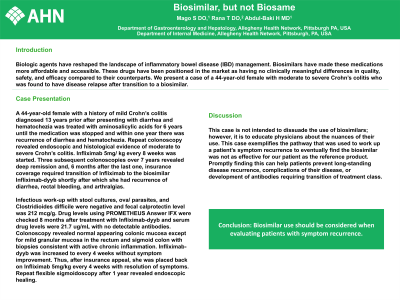Monday Poster Session
Category: IBD
P2712 - Biosimilar, But Not Biosame
Monday, October 28, 2024
10:30 AM - 4:00 PM ET
Location: Exhibit Hall E

Has Audio
- TR
Tabeer Rana, DO
Allegheny Health Network
Pittsburgh, PA
Presenting Author(s)
Sheena Mago, DO, Tabeer Rana, DO, Heitham Abdul-Baki, MD
Allegheny Health Network, Pittsburgh, PA
Introduction: Biologic agents have reshaped the landscape of inflammatory bowel disease (IBD) management and biosimilars have made these medications more affordable and accessible. These drugs have been positioned in the market as having no clinically meaningful differences in quality, safety, and efficacy compared to their counterparts. We present a case of a 44-year-old female with moderate to severe Crohn’s colitis who was found to have disease relapse after transition to a biosimilar.
Case Description/Methods: A 44-year-old female with a history of mild Crohn’s colitis diagnosed 13 years prior after presenting with diarrhea and hematochezia was treated with aminosalicylic acids for 6 years until the medication was stopped and within one year there was recurrence of diarrhea and hematochezia. Repeat colonoscopy revealed endoscopic and histologic evidence of moderate to severe Crohn’s colitis and Infliximab 5 mg/kg every 8 weeks was started. Three subsequent colonoscopies over 7 years revealed deep remission and 6 months after the last one insurance coverage required transition of Infliximab to the biosimilar Infliximab-dyyb shortly after which she had recurrence of diarrhea, rectal bleeding, and arthralgias. Infectious work-up with stool cultures, ova/parasites, and Clostridioides difficile were negative and fecal calprotectin level was 212 mcg/g. Drug levels using PROMETHEUS Anser IFX were checked 8 months after treatment with Infliximab-dyyb and serum drug levels were 21.7 ug/mL with no detectable antibodies. Colonoscopy revealed normal appearing colonic mucosa except for mild granular mucosa in the rectum and sigmoid colon with biopsies consistent with active chronic inflammation. Infliximab-dyyb was increased to every 4 weeks without symptom improvement. Thus, after insurance appeal she was placed back on Infliximab 5 mg/kg every 4 weeks with resolution of symptoms. Repeat flexible sigmoidoscopy after 1 year revealed endoscopic healing.
Discussion: This case is not intended to dissuade the use of biosimilars; however, it is to educate physicians about the nuances of their use. This case exemplifies the pathway that was used to work up a patient’s symptom recurrence to eventually find the biosimilar was not as effective for our patient as the reference product. Promptly finding this can help patients prevent long-standing disease recurrence, complications of their disease, or development of antibodies requiring transition of treatment class.
Disclosures:
Sheena Mago, DO, Tabeer Rana, DO, Heitham Abdul-Baki, MD. P2712 - Biosimilar, But Not Biosame, ACG 2024 Annual Scientific Meeting Abstracts. Philadelphia, PA: American College of Gastroenterology.
Allegheny Health Network, Pittsburgh, PA
Introduction: Biologic agents have reshaped the landscape of inflammatory bowel disease (IBD) management and biosimilars have made these medications more affordable and accessible. These drugs have been positioned in the market as having no clinically meaningful differences in quality, safety, and efficacy compared to their counterparts. We present a case of a 44-year-old female with moderate to severe Crohn’s colitis who was found to have disease relapse after transition to a biosimilar.
Case Description/Methods: A 44-year-old female with a history of mild Crohn’s colitis diagnosed 13 years prior after presenting with diarrhea and hematochezia was treated with aminosalicylic acids for 6 years until the medication was stopped and within one year there was recurrence of diarrhea and hematochezia. Repeat colonoscopy revealed endoscopic and histologic evidence of moderate to severe Crohn’s colitis and Infliximab 5 mg/kg every 8 weeks was started. Three subsequent colonoscopies over 7 years revealed deep remission and 6 months after the last one insurance coverage required transition of Infliximab to the biosimilar Infliximab-dyyb shortly after which she had recurrence of diarrhea, rectal bleeding, and arthralgias. Infectious work-up with stool cultures, ova/parasites, and Clostridioides difficile were negative and fecal calprotectin level was 212 mcg/g. Drug levels using PROMETHEUS Anser IFX were checked 8 months after treatment with Infliximab-dyyb and serum drug levels were 21.7 ug/mL with no detectable antibodies. Colonoscopy revealed normal appearing colonic mucosa except for mild granular mucosa in the rectum and sigmoid colon with biopsies consistent with active chronic inflammation. Infliximab-dyyb was increased to every 4 weeks without symptom improvement. Thus, after insurance appeal she was placed back on Infliximab 5 mg/kg every 4 weeks with resolution of symptoms. Repeat flexible sigmoidoscopy after 1 year revealed endoscopic healing.
Discussion: This case is not intended to dissuade the use of biosimilars; however, it is to educate physicians about the nuances of their use. This case exemplifies the pathway that was used to work up a patient’s symptom recurrence to eventually find the biosimilar was not as effective for our patient as the reference product. Promptly finding this can help patients prevent long-standing disease recurrence, complications of their disease, or development of antibodies requiring transition of treatment class.
Disclosures:
Sheena Mago indicated no relevant financial relationships.
Tabeer Rana indicated no relevant financial relationships.
Heitham Abdul-Baki indicated no relevant financial relationships.
Sheena Mago, DO, Tabeer Rana, DO, Heitham Abdul-Baki, MD. P2712 - Biosimilar, But Not Biosame, ACG 2024 Annual Scientific Meeting Abstracts. Philadelphia, PA: American College of Gastroenterology.
